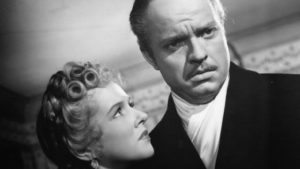 The Film Snob argues against the common notion that the story and characters of Citizen Kane are cold and uninvolving, with an analysis of its dramatic structure and power.
The Film Snob argues against the common notion that the story and characters of Citizen Kane are cold and uninvolving, with an analysis of its dramatic structure and power.
This week, as promised, I’m continuing my discussion of Citizen Kane, Orson Welles’ famous debut film from 1941. Last time I talked about why the film’s technique was so revolutionary in the context of the standard filmmaking style in Hollywood. But another complaint I hear from those who claim that Citizen Kane is “overrated” is that the film leaves them cold, that the story is uninteresting, and they don’t care enough about the main character, Charles Foster Kane.
First, to briefly summarize the plot, I’ll just say that it starts with a brief sequence showing Kane’s death, followed by a newsreel, done in the style of the famous “March of Time” films, covering the life of Kane, a famous newspaper publisher and political figure. But the newsreel producer wants one more thing before releasing it: to solve the mystery of the word Kane said on his deathbed: “Rosebud,” and he assigns a reporter to investigate. Through the reminder of the picture, Kane’s story is told to the reporter by five different people who knew him.
Now, the Hollywood film adhered to ideas of storytelling that were very conservative and formulaic. Boy loses, then gets girl. Good guy battles and triumphs over adversity. Virtue is threatened by evil and saved by love. The form was always more akin to popular genre fiction than to serious literary fiction or drama. When we turn to Citizen Kane, however, we find a willingness to challenge the viewer with complexity and intelligence and even political ideas. Its main character is deeply flawed. The young man in the earlier sequences—idealistic, attractive, arrogant–devolves into a ruthless, grasping, isolated and bitter old man. Along the way he suffers humiliating failure and loss while putting the people who love him through hell.
This brings me to the comment about not caring enough about Kane to enjoy the movie. The idea that we need to cuddle up to a movie’s main character, to love him and identify with him (or her) in order to enjoy a film—this has to be one of the biggest obstacles to true seriousness in the art of film. It severely limits us because it blocks us from portrayals of human beings as they really are in favor of phony ideas of how they should be.
In point of fact, Kane is seen as vulnerable, tender and wounded as well as cruel, selfish and dominating. His struggles are in the tradition of the tragic hero whose faults lead to his downfall. That ultimately Kane cannot love anyone is the source of the film’s pathos, precisely what makes the portrait so moving. And the refusal of the film to draw simple conclusions, its skill at presenting truths which evade rational analysis but are deeply felt, give it a subtlety and a power that does not diminish with repeated viewings. Welles lets the audience think for itself. The gigantic ambitions and failures of such a man remind us of our own turmoils. His tragedy is also meant to be the tragedy of America—great and idealistic, but also blind and rapacious. Alone among the American films of that era, Citizen Kane presents a hero who also resonates with national and mythic meanings.
Suffice it to say that Citizen Kane moves me, and I cannot understand how people can think it is cold or uninvolving. The final shots never fail to bring tears to my eyes, a feeling of grief about striving and ambitious people, restlessly seeking to attain more and more, but ending in loneliness, ending with a word which recalls a time when possessions didn’t matter, only the hope and simple need for love of a child.
Overrated? Perhaps we over-praise when a work breaks through barriers and frees our eyes to new sights. Perhaps the exhilaration of such a work makes us intoxicated, and we overdo our superlatives. Perhaps, though, that is only a measure of our need for films that take chances, that are not timid, but dare to follow a vision to the end.

